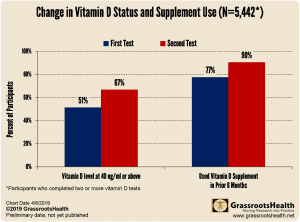BU Commentary: Vitamin D Supplementation Was Found to Improve More Than 1.5 Fold Survival of Cancers of the Digestive Tract Including Colorectal Cancer in Patients with a Cancer Fighting Immune System
Key Points
- Results from a new study by Kanno et al. support the significant body of associated evidence and clinical studies concluding that improvement in vitamin D status through vitamin D supplementation can be an effective strategy for improving survival outcomes of cancers especially of the digestive tract including colorectal cancer
- In the study, patients whose immune system is on high alert and produces antibodies to control the production and release of the mutated p53 protein were more likely, by more than 2.5 fold, to improve their chances of surviving the cancer if they also took daily 2000 IUs vitamin D3 compared to patients who had the antibodies but did not take vitamin D supplementation
 TUESDAY, August 22, 2023 (Boston) — For more than 100 years, it has been believed that sunlight and vitamin D deficiency were associated with the risk for many deadly cancers including colorectal, prostate and breast. But some scientists remained skeptical that this nutrient provides any benefit for reducing cancer risk and morbidity and mortality and several randomized controlled trials that have supported this doubt.
TUESDAY, August 22, 2023 (Boston) — For more than 100 years, it has been believed that sunlight and vitamin D deficiency were associated with the risk for many deadly cancers including colorectal, prostate and breast. But some scientists remained skeptical that this nutrient provides any benefit for reducing cancer risk and morbidity and mortality and several randomized controlled trials that have supported this doubt.
However, in a new commentary in JAMA Network Open, Michael F. Holick, PhD, MD, professor of medicine, pharmacology, physiology & biophysics and molecular medicine at Boston University Chobanian & Avedisian School of Medicine, explores the controversy as to whether improving vitamin D status has any benefit for reducing risk of developing cancer as well as improving relapse-free and mortality outcomes.
He believes the results of the Kanno et al. study (“Effect of Vitamin D Supplements on Relapse or Death in a p53-immunoreactive Subgroup with Digestive Tract Cancer: Post Hoc Analysis of the AMATERASU 5 Randomized Clinical Trial”) support the significant body of associated evidence and clinical studies concluding that improvement in vitamin D status through vitamin D supplementation can be an effective strategy for improving survival outcomes of cancers especially of the digestive tract including colorectal cancer.
“We now recognize that there are a variety of variables that can influence how vitamin D prevents and responds to cancer. For example, being at a normal weight and taking vitamin D improves your ability to survive cancer. Other factors include the patient’s genetic makeup and how the patient utilizes and breaks down vitamin D,” explains Holick, corresponding author of the piece.
The study by Kanno et. al. provides further insight. The p53 gene produces the p53 protein to prevent cells from becoming malignant. Cancer cleverly mutates this gene and the mutated p53 protein helps the cancer to grow and become immune to cancer therapy. Kanno et. al. found that patients whose immune system is on high alert and produces antibodies to control the production and release of this mutated p53 protein were more likely, by more than 2.5 fold, to improve their chances of surviving the cancer if they also took daily 2000 IUs vitamin D3 compared to patients who had the antibodies but did not take vitamin D supplementation. Those patients who did not produce the antibodies received no survival benefit by taking the vitamin D supplement.
Holick believes it would be worthwhile to conduct a retrospective analysis for serum p53 antibodies and the immunohistochemical presence for p53 in histologic cancer samples of breast, prostate and other cancer studies that found no benefit when they evaluated the potential impact of vitamin D supplementation on improving cancer survival.
More importantly, Holick believes future studies evaluating vitamin D supplementation for the prevention and improvement of cancer outcomes should now include not only many of the variables mentioned above, but also include a measurement for p53 antibodies in the blood and immunohistochemical presence of p53 in cancer tissue samples.
According to Holick, it is important to recognize that most of the studies that have shown that vitamin D3 supplementation improves cancer survival provided patients with at least 2000 IUs vitamin D3. This amount of vitamin D3 substantially improves the vitamin D status (serum concentration of 25-hydroxyvitamin D) to a concentration above 30 ng/mL. This amount of vitamin D3 was not reported to cause any toxicity
“It is well-documented that in order to achieve a circulating concentration of 25(OH)D above 30 ng/mL (75 nmol/L) requires a vitamin D intake of at least 2000 IUs daily, an amount that cannot be achieved from diet alone but requires vitamin D supplementation. Although vitamin D is the sunshine vitamin you cannot get enough vitamin D from sun exposure unless you expose more than 20% of your body surface to sunlight almost daily like the Maasai and Hazda do in equatorial Africa,” said Holick.
Contact: Maria Ober, 617-224-8963, [email protected]
—
Are You Getting Enough Vitamin D? Check Now!
Why is it Important to Focus on Your Vitamin D Level vs Intake?
Due to the large range of variability in the response to a particular dose, vitamin D testing should be used to personalize the intake amount. This is because there are many factors that affect the dose response to supplementation (including BMI and various co-nutrients such as magnesium).
 As an example, among 5,442 GrassrootsHealth participants who completed at least two vitamin D tests, approximately half (51%) achieved 40 ng/ml on their first test compared to two-thirds (67%) on their second test – leaving 1/3 of those who re-tested still below the 40 ng/ml target level.
As an example, among 5,442 GrassrootsHealth participants who completed at least two vitamin D tests, approximately half (51%) achieved 40 ng/ml on their first test compared to two-thirds (67%) on their second test – leaving 1/3 of those who re-tested still below the 40 ng/ml target level.
Additionally, we often need to adjust the dose we are taking to suit our bodies’ needs and the only way to know that is to measure. The median vitamin D supplement intake amount increased from 2000 IU/day on the first test to 4000 IU/day on the second test. Among those who were less than 40 ng/ml on their first test, a majority increased their supplemental intake amount (76%) and their vitamin D level (81%) between their first and second tests.
Testing your vitamin D level regularly and taking steps to keep it at a target level of 40-60 ng/ml (100-150 nmol/L) is important for all stages of health. Through GrassrootsHealth Nutrient Research Institute, you can also test your omega-3 status, inflammation levels, and levels of essential nutrients and toxins. Find out your levels today! Log on to the shop (click the link below) to get your tests and see for yourself if your level can be improved.
Make Sure You Are Getting Enough of the Right Nutrients
Create your custom home blood spot kit to help determine if you are getting enough of the following nutrients shown to benefit overall health, along with other measures, including:
 Vitamin D
Vitamin D- Omega-3 Index plus AA:EPA Ratio
- Magnesium (plus Zinc, Copper, Selenium, Lead, Cadmium & Mercury)
- hsCRP
- HbA1c
- Type 1 Diabetes Autoantibodies
- TSH
Enroll and test your levels today, learn what steps to take to improve your status of omega-3s, vitamin D and other nutrients and blood markers, and take action! By enrolling in the GrassrootsHealth projects, you are not only contributing valuable information to everyone, you are also gaining knowledge about how you could improve your own health through measuring and tracking your nutrient status, and educating yourself on how to improve it.


 Vitamin D
Vitamin D